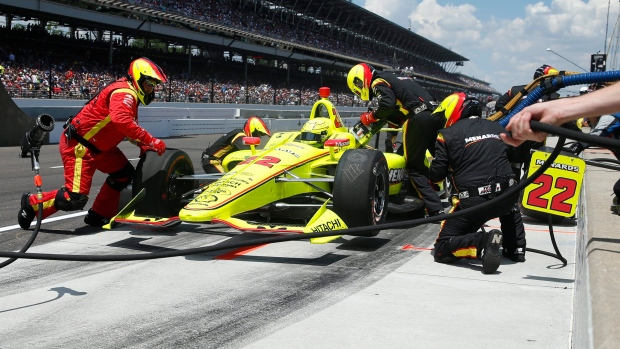May 30, 2018
Drivers applaud new IndyCar for putting them back in control
The new version of the IndyCar that made its Indianapolis 500 debut on Sunday was hard to drive in traffic, difficult to pass and so squirrely in the corners that some of the sport's biggest names found an unceremonious end to their day in the wall.
The Canadian Press

INDIANAPOLIS — The new version of the IndyCar that made its Indianapolis 500 debut on Sunday was hard to drive in traffic, difficult to pass and so squirrely in the corners that some of the sport's biggest names found an unceremonious end to their day in the wall.
For the most part, though, the throwback look was met with positive reviews.
The body kit from Italian chassis manufacturer Dallara was designed with input from executives, drivers and fans, and all of them wanted a car that looked like those of the 1990s. And while Dallara was spot-on in that respect, the big question was how the car would drive on Indy's massive oval.
The speed was there from the start. The handling was often a struggle. But at the end of the day, the car produced a worthy winner in Will Power with enough room to improve it going forward.
"It put the driver back into it more," Power said, "in my opinion."
Power happens to be one of the best tacticians in IndyCar, and at one time he loathed ovals because they put the outcome in the hands of engineers rather than drivers. So it's hardly a surprise that he was happy to see a design that emphasized and rewarded talent along with pure speed.
Especially because he was in the lead at the end.
The old body kit, which offered manufacturers Chevrolet and Honda more latitude for changes, had a flaw when it came to running up front. It was too easy for the trailing car to suck up behind in the draft, then slingshot past at the last moment, leaving the race leader a sitting duck.
"This was a race you wanted to lead. At last they had a formula, if you had a good car, the leader could benefit and pull away," Power said. "It definitely made it harder to drive. Put the driver back into it more, where before you could hang back, third — no one wanted to lead."
In that respect, Ed Carpenter surely missed the old chassis. He spent the last couple of laps Sunday trying in vain to run Power down. But rather than close in and slingshot past, the gap only grew, and the man who calls Indianapolis home was left to settle for second place.
Yet even Carpenter praised the new body kit , calling it a step in the right direction.
"I like the way it drives. It's definitely challenging to the driver," said Carpenter, an oval ace who hands off his ride to a teammate on road courses. "I like it when it's hard. I was hoping it would be hot because it makes it even more difficult. The old car, if you had a really good car you couldn't get rewarded by getting away, getting separated."
That said, Power and Carpenter both acknowledged that some changes need to be made.
The chassis, which will run through at least 2021 and perhaps longer, was designed with input from drivers who said they wanted more downforce produced by ground effects than the wing. But the result was a package that some drivers said produced too little downforce, making it hard to pass in open air.
"It's almost like the cars need a little more drag to make that happen, or maybe a little bit of downforce so you can stay closer, utilize it. Seemed like you had to come from quite a long ways back," said Scott Dixon, who finished third. "It won't take much. It will just be a little tweak to help that out. Yeah, I think even from the tire you could do something there, too."
Even the drivers who failed to finish thought the car was a move in the right direction.
Tony Kanaan lost his car with no one around him and hit the wall. So did Sebastien Bourdais, three-time winner Helio Castroneves and Danica Patrick, who was competing in her final race.
"When you think about the package and look at guys like Helio and Kanaan and Bourdais and Danica and the top drivers that were driving at the limit because they lost control of the car, reminded me a lot of the past," team owner Roger Penske said. "Because of the low downforce, you don't have this tremendous cornering power so when they did spin, you didn't have these violent accidents."
Kanaan was running near the front early before a tire puncture got him out of pit sequence. He began working his way through the field again, showcasing the same driving acumen that won him the Indy 500 in 2013, before the smallest of slipups caused his A.J. Foyt Racing entry to find the wall.
"It's constantly changing. You have a car you can run in traffic, a car you can run on your own. It's a lot more difficult, a lot more work," Kanaan said, "but it's a positive thing."
___
More AP auto racing: https://racing.ap.org
